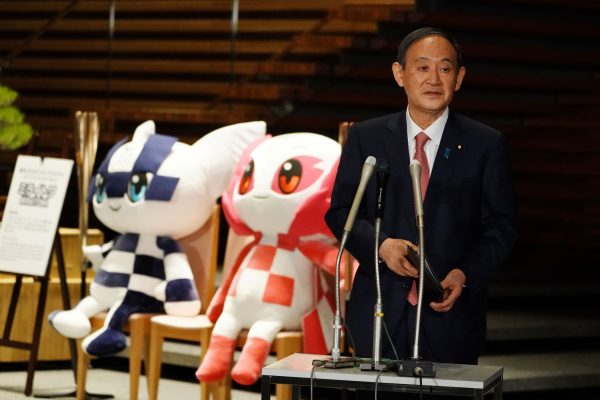The Abe administration publicly denied such claims — with some justification. Sentinel reporting suggests that Japan’s early adoption of mask wearing, social distancing and ‘self-restraint’ (jishuku) reduced viral transmission in 2020, including for influenza. Japan’s low PCR test positivity rate for COVID-19 sat at around the World Health Organization’s 5 per cent indicator of sufficient testing throughout 2020 and was decreasing before the Summer Olympics were postponed. Overall mortality even fell in 2020, including a 16.1 per cent reduction in total pneumonia deaths during the period when testing was lowest.
This success is attributed to the ‘Japan model’ of pandemic suppression. Medical authorities focused testing and tracing on containing ‘clusters’ while the public engaged in selective social distancing by avoiding the ‘3Cs’ of closed spaces, crowded places and close-contact.
Antibody testing later confirmed 2020’s suppression success, but it also showed that the Japanese population remained vulnerable to the faster spreading SARS‑CoV‑2 variants that began to proliferate in early 2021. New waves of infection pushed medical services beyond their limit in the new year and official COVID-19 death tolls began to exceed 100 per day for the first time. Japan saw 10,000 new deaths in the first five months of 2021 — compared to 3466 in all of 2020.
While these numbers are low by global standards, the Japanese public has been unforgiving of new prime minister Yoshihide Suga’s personal leadership and the government’s overall COVID-19 response — as was also the case under prime minister Shinzo Abe. The mean net rating of the government’s response from seven major media organisation public opinion surveys over the past five months was negative. This was preceded by a record dive in cabinet support at the end of 2020 when Suga was criticised for prioritising the economy over pandemic suppression with his ‘Go-To’ domestic travel campaign. Similar accusations were also lobbed at the administration over the Olympics.
Japan’s difficult vaccine safety history aside, the rising rate of COVID-19 infections in 2021 and Suga’s deteriorating political reputation only made Tokyo’s slow vaccination rollout less comprehensible. By early May, only 15 per cent of Japan’s 28 million dose vaccine stockpile had been administered. With two million health workers and 97.8 per cent of the population unvaccinated two months out from the Summer Olympics, public opposition to the Games heightened. The government’s panel of experts also cast doubt over the Suga administration’s determination to hold Olympic events with a sizeable number of attendees.
From the start of May, vaccination rates started to rapidly increase. Health workers and almost all elderly people in Japan will be vaccinated just in time for the Olympics. With infection rates holding steady among already very limited restrictions in Tokyo, Japan’s hot and humid summer may also help naturally suppress the spread of COVID-19. University of Tokyo researchers reported that with some limitations on movement a ‘safe’ Olympics is plausible. Public opinion has also started turning back to supporting the Games.
So the government looks to be taking a calculated risk that it can hold the Games without them becoming a ‘super-spreader athletic extravaganza’. Japan can still extract some economic benefit from a scaled-down Olympics, while the government may get a political boost by holding an election immediately after — assuming it doesn’t face the ignominy of having to call a state of emergency during the Games.
Prime Minister Suga must also face a Liberal Democratic Party (LDP) leadership contest in September. Unlike the race to replace Abe last year, this contest will poll grassroots LDP members, so public opinion will play a greater role. Worryingly for Suga, he has presided over a rare drop in the LDP voter intention since September last year. The public, it seems, is not particularly attached to the prime minister and he is consistently placed fifth among LDP politicians as preferred leader, well behind front runner Taro Kono and trailing even Abe.
Unlike his predecessor, Suga is vulnerable to small shifts in opinion within the party. Abe came from the LDP’s largest faction, while Suga lacks one of his own. Abe also skilfully used the trauma of the LDP’s 2009 loss and three years in opposition to discipline early career LDP parliamentarians. But Suga faces ambitious leadership rivals and a cadre of more experienced legislators who sat quietly in the wings over the last eight years as Abe and Suga limited turnover in top-level party and cabinet positions.
With many in the party eager to hasten in a truly ‘post-Abe’ era, it is hard to shake the sense that Suga has been positioned to ‘take responsibility’ for COVID-19 and Olympics-related misfires. Suga’s calculated Olympics risk leaves him no room for error in his quest to become more than a ‘caretaker’ prime minister.
Corey Wallace is Assistant Professor at Kanagawa University.
This article is part of an EAF special feature series on the COVID-19 crisis and its impact.

